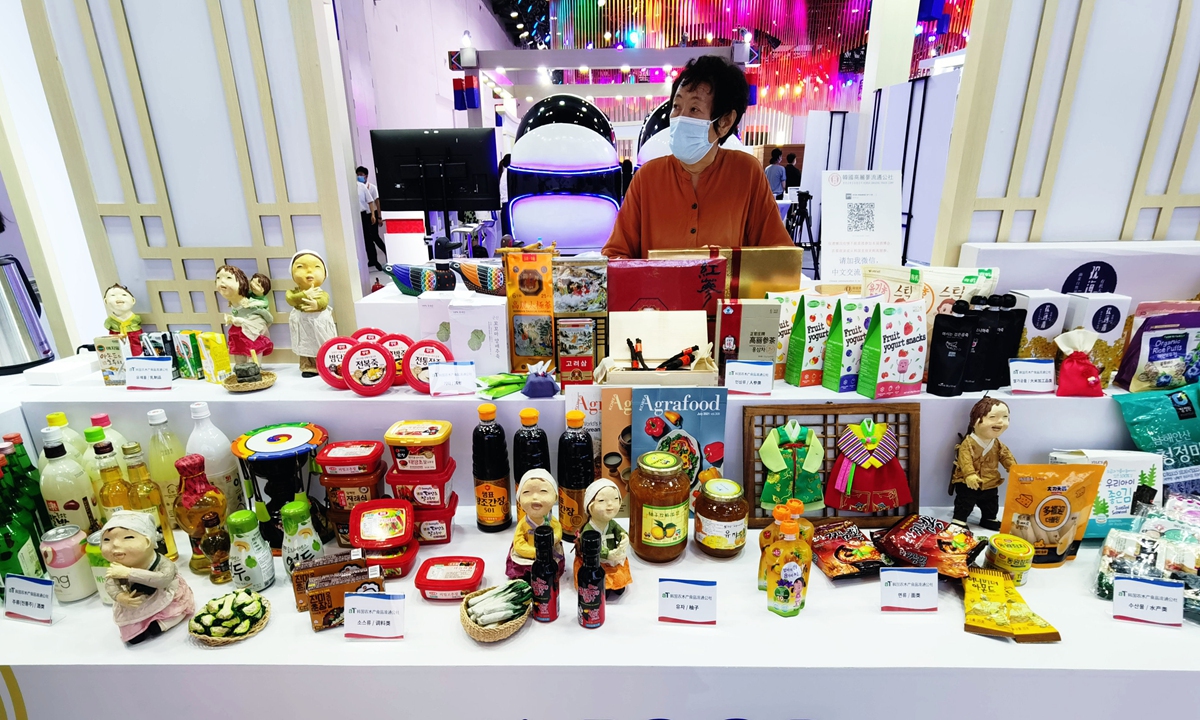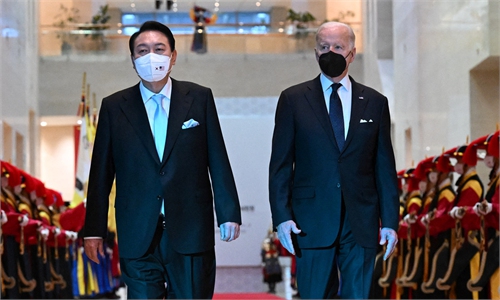
South Korean food being exhibited during the China International Fair for Trade in Services Photo: VCG
South Korea's export-oriented economy is losing momentum, as a variety of economic indicators reflect weakening performance across the board, and analysts warned of further headwinds for the economy.The South Korean economy is expected to remain in a period of sluggish growth next year with annual GDP growth easing to 1.8 percent, a downgrade from the 2.3-percent pace forecast six months ago, Reuters reported, citing data from the state-run think tank Korea Development Institute.
Exports, which account for nearly 40 percent of the economy, have been seen as the biggest drag on growth. In the third quarter, South Korea's GDP growth fell to its slowest in a year. Net exports dragged the economy down by 1.8 percent, offsetting pent-up private consumption after most COVID-19 curbs were removed, according to another Reuters report.
As the country's tech exports account for a third of South Korea's total shipments abroad, a slowdown in global demand for semiconductors, a key part of South Korea's economy, has become a rising concern. Semiconductor production slid 1.7 percent in August from a year earlier, a sharp reversal from the 17.3 percent gain reported in July, according to Bloomberg. It is the first fall that has been registered since January 2018.
In addition to a slowdown in global demand, the US efforts to bring manufacturing back from overseas - a move often called reshoring - have received more attention than usual. The administration of US President Joe Biden has announced concrete actions, such as the so-called CHIPS Act and the Inflation Reduction Act to encourage companies to return to the US to install new production lines.
Some have recently warned that US protectionist measures against its trade partners may lead to a hollowing-out of the manufacturing sector in South Korea. Seoul should consider the long-term negative impact on the South Korean economy.
The international environment now is more complicated than before. Close South Korea-US cooperation is needed for Seoul for multiple reasons, but it is also understandable that the Asian country hopes its cooperation with the US can be mutually beneficial and will not harm the interests of South Korean companies in the Chinese market.
China is South Korea's biggest export partner. South Korean exports to China has jumped 162 times since the two countries forged diplomatic ties, far more than the overall outbound shipments of South Korean economy that grew nine fold in the same period, South Korean news site koreaherald.com reported. Semiconductor exports made up 39.7 percent of South Korea's total exports to China last year, a 13-fold surge from 3.2 percent in 2000, the report said.
At a summit of leaders from the Association of Southeast Asian Nations (ASEAN) plus China, South Korea and Japan, South Korean President Yoon Suk-yeol urged stronger join efforts to overcome complex future crises, such as those stemming from global food and energy woes, according to media reports.
A dynamic cooperation should be further consolidated and carried on, which is in the interest of both South Korea and China. There are many topics worthy of in-depth communication among countries in the region.
In recent years, China has actively strengthened multilateral cooperation with ASEAN, South Korea and Japan, and promoted the integration of regional industrial and supply chains to make continuous progress.
The whole of the East and Southeast Asia is one of the most dynamic and fastest growing regions in the world. If South Korea wants to achieve sustainable economic development, the nation should encourage local enterprises to continue to increase their presence in the region and further integrate itself into the regional supply chains.
Obviously, some Western countries do not want to see South Korea's relations with nations in the region maintain a healthy and stable momentum of development, but now those Western nations lack the ability to bring benefits to the South Korean economy while pursuing economic protectionism and adopting a strategy of reshoring their supply chains. Under this background, South Korea should focus more on the economic opportunities in Asia.



